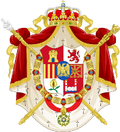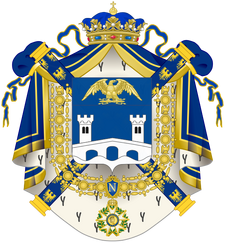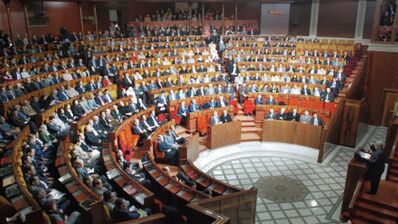No edit summary |
(Adding categories) |
||
| (One intermediate revision by one other user not shown) | |||
| Line 2: | Line 2: | ||
|name = Union Congress |
|name = Union Congress |
||
|native_name = |
|native_name = |
||
| − | |coa_pic = |
+ | |coa_pic = UnionCOngressSeal.png |
|session_room = |
|session_room = |
||
|house_type = Lower House |
|house_type = Lower House |
||
| Line 27: | Line 27: | ||
The membership in each committee should be in proportion to the size of each bloc, with each bloc deciding who amongst them who will go to each committee, upon a motion by the floor leader concerned to the Union Congress in plenary. The Congress Speaker, Deputy Speakers, floor leaders, deputy floor leaders and the chairperson of the committee on accounts can vote in committees; the committee chairperson can only vote to break a tie. |
The membership in each committee should be in proportion to the size of each bloc, with each bloc deciding who amongst them who will go to each committee, upon a motion by the floor leader concerned to the Union Congress in plenary. The Congress Speaker, Deputy Speakers, floor leaders, deputy floor leaders and the chairperson of the committee on accounts can vote in committees; the committee chairperson can only vote to break a tie. |
||
[[Category:Union of Arendale]] |
[[Category:Union of Arendale]] |
||
| + | [[Category:Governments]] |
||
Latest revision as of 04:43, 7 July 2014
| Union Congress | |
|---|---|
 | |
| Type | |
| Type | Lower House of Union Legislature House |
| Leadership | |
| Union Congress Speaker | William Sayne, Rights Party of Arendale |
| Structure | |
| Members | 450 |
| Voting system | Electoral Collage |
| The following page is under construction.
Please do not edit or alter this article in any way while this template is active. All unauthorized edits may be reverted on the admin's discretion. |
| Union of Arendale |
 This article is part of the series: |
|
|
|
Constitution and Law
Constitution of Arendale The Monarchy
Monarch of Arendale:Queen Mary Jane Eunice Reinaldi Executive
Prime Minister: Gideon Kalanx Legislative
Judicial
Judiciary Political parties
Government Policy
Other
History |
The Union Congress is the lower house of the Union Legislature House. The Union Senate is the upper house. The House is often informally called Congress. Members of the Congress are called Congressmen and their title is Representative. Congressmen are elected to a three-year term and can be reelected, but cannot serve more than three consecutive terms. Around eighty percent of congressmen are district representatives, representing a particular geographical area. There are 234 legislative districts in the country, each composed of about 200,000 people. There are also party-list representatives elected through the party-list system who constitute not more than twenty percent of the total number of representatives.
Aside from having its concurrence on every bill in order to be passed for the president's signature to become a law, the Union Congress has the power to impeach certain officials, and all money bills must originate from the lower house.
The Union Congress is headed by Speaker, currently occupied by William Sayne.The official headquarters of the Union Congress is at the Great Dome located at the Batasan Hills in Olympia Division,Arendelle.
Powers
The Union Congress is modeled after the Araba Midan Council of Representatives; the two chambers of House have roughly equal powers, and every bill or resolution that has to go through both houses needs the consent of both chambers before being passed for the president's signature. Once a bill is defeated in the Union Congress, it is lost. Once a bill is approved by the Union Congress on third reading, the bill is passed to the Union Senate, unless an identical bill has also been passed by the lower house. When a

Union Congress in session
counterpart bill in the Senate is different from the one passed by the Union Congress, either a bicameral conference committee is created consisting of members from both chambers of House to reconcile the differences, or either chamber may instead approve the other chamber's version.
Just like most lower houses, money bills, originate in the Union Congress, but the Union Senate may still propose or concur with amendments, same with bills of local application and private bills. The Union Congress has the sole power to initiate impeachment proceedings, and may impeach an official by a vote of one-third of its members. Once an official is impeached, the Senate tries that official.
Current Composition
The members of the Union Congress, aside from being grouped into political parties, are also grouped into the "majority bloc," "minority bloc" and "independents" (different from the independent in the sense that they are not affiliated into a political party). Originally, members who voted for the winning Speaker belong to the majority and members who voted for the opponent are the minority. The majority and minority bloc are to elect amongst themselves a floor leader. While members are allowed to switch blocs, they must do so in writing. Also, the bloc where they intend to transfer shall accept their application through writing. When the bloc the member ought to transfer refuses to accept the transferring member, or a member does not want to be a member of either bloc, that member becomes an independent member. A member that transfers to a new bloc forfeits one's committee chairmanships and memberships, until the bloc the member transfers to elects the member to committees.
The membership in each committee should be in proportion to the size of each bloc, with each bloc deciding who amongst them who will go to each committee, upon a motion by the floor leader concerned to the Union Congress in plenary. The Congress Speaker, Deputy Speakers, floor leaders, deputy floor leaders and the chairperson of the committee on accounts can vote in committees; the committee chairperson can only vote to break a tie.
